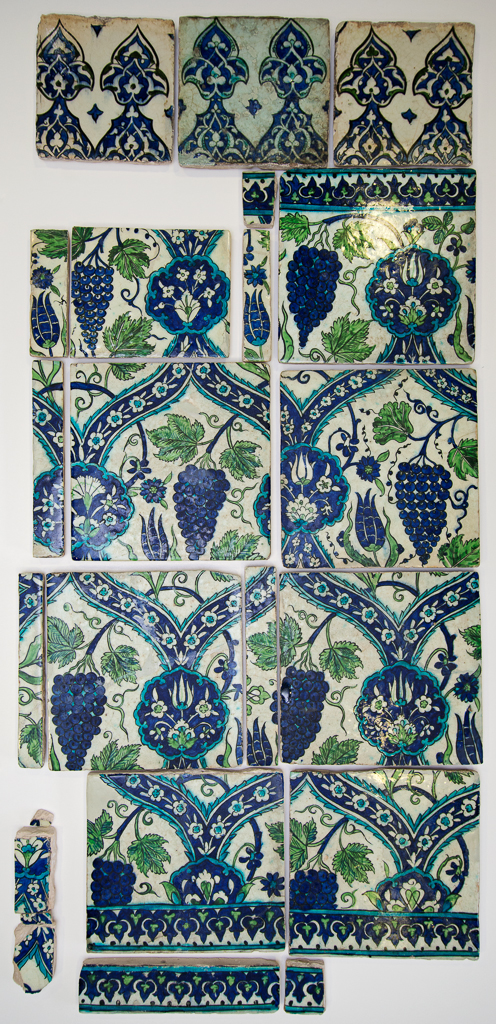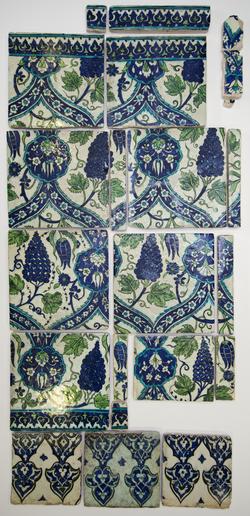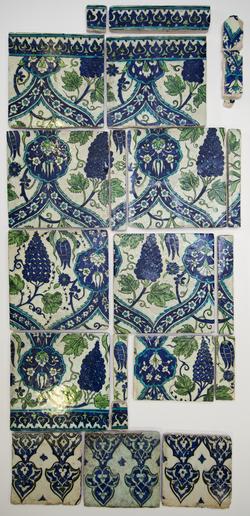Current Location: In storage
Maker(s)
Potter:
Unknown
Entities
Categories
Description
Fritware, mould made, painted in blue, green, turquoise and black under a colourless glaze
Shape: comprised of twenty three tiles (labelled A-W) that form a tile panel of five rows. All tiles are rectangular or square in shape with original edges slightly bevelled.
1st (upper) row = equal shape, roughly square tiles labelled A, B, C
2nd row = two large rectangular tiles (D, J) with smaller rectangular off cuts (P, R, S)
3rd row = two large rectangular tiles (H, G) with smaller rectangular off cut (N)
4th row = two large rectangular tiles (K, I) with one smaller rectangular off cut (M, O)
5th (lower) row = two large rectangular tiles (E, F) with four fragments, three of which are rectangular (L, Q, T, U, V) and one large chip (W).
Upper surface: all decoration is outlined in black. On the 1st row three tiles are painted with a frieze of arcading toped with palmettes containing split leaf arabesques that are reserved in blue and highlighted with green. This initial row may have been taken from a different context to the remaining rows. The remaining four rows contain tiles that are all decorated with a similar pattern comprising festooned manderolas linked by sinuous stems, both bordered with turquoise and containing floral sprays reserved in blue with green or turquoise. The surrounding area is filed with vine leaves, bunches of grapes and flowers including tulips painted in blue or green with turquoise highlights. On the bottom and the top row a palmette border is painted in blue and green, contained within two turquoise bands.
Lower surface: undecorated except for splashes of glaze and areas of plaster
Notes
History note: William Morris; Morris & Co.
Legal notes
Given by the Friends of the Fitzwilliam Museum
Measurements and weight
Depth: 2.5 cm
Height: 126.5 cm
Width: 59 cm
Acquisition and important dates
Method of acquisition: Given
(1928-06-04)
by
The Friends of the Fitzwilliam Museum
Dating
16th Century
Circa
1560
CE
-
1600
CE
Note
The design is comparable to tiles in the Darwishiyya Mosque, Damascus (1571)
School or Style
Ottoman
Components of the work
Upper Surface
composed of
pigments
( blue, green, turquoise, with black outlines)
Decoration
composed of
glaze
( colourless, cracked in places)
Materials used in production
Fritware
Techniques used in production
Moulding
: Pale buff frit body painted in blue, green and turquoise-blue, outlined in black, under a clear glaze
References and bibliographic entries
Identification numbers
Accession number: C.4-1928
Primary reference Number: 17534
Stable URI
Audit data
Created: Saturday 6 August 2011
Updated: Wednesday 12 February 2025
Last processed: Tuesday 13 May 2025
Associated departments & institutions
Owner or interested party:
The Fitzwilliam Museum
Associated department:
Applied Arts

 IIIF Manifest
IIIF Manifest





